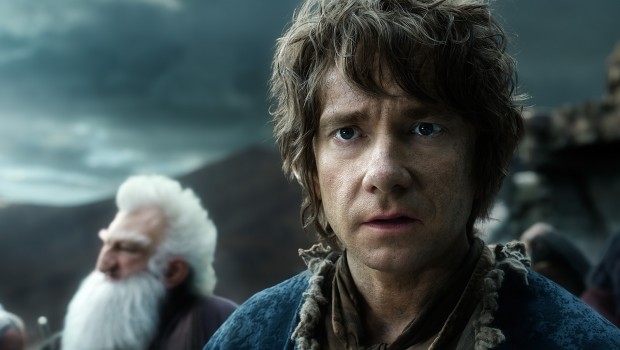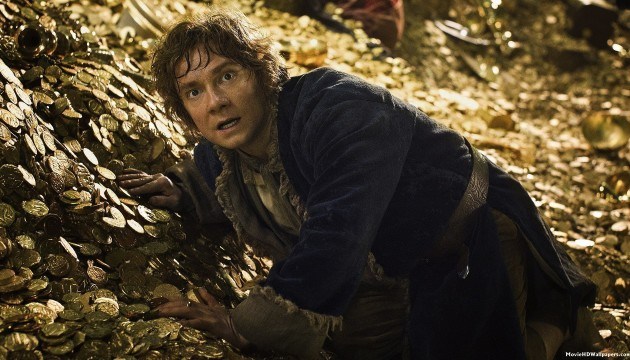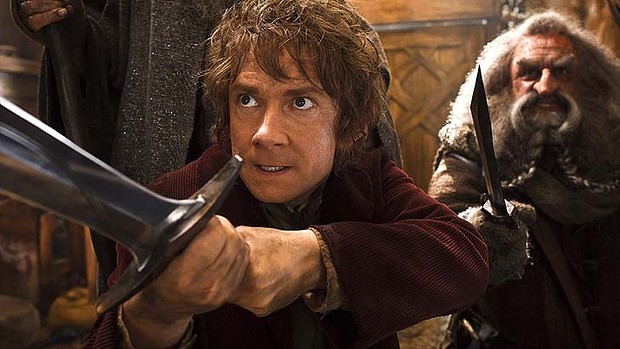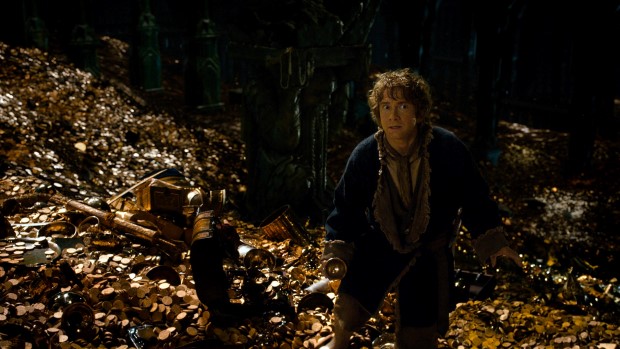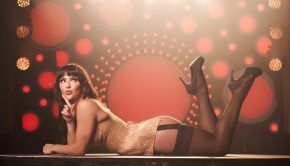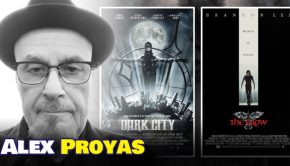MARTIN FREEMAN (BILBO) INTERVIEW
QUESTION: How has your life changed over these years, with Sherlock, Fargo and The Hobbit films all proving so successful?
MARTIN FREEMAN: Those things have definitely altogether made a real change and a lovely change—I welcome it, of course. I genuinely feel very lucky to have all these plates spinning at once. It’s fantastic. It’s more than you can hope for. So, yeah, my life has changed. It’s more busy.
QUESTION: Do people shout ‘Bilbo’ at you in the street?
MARTIN FREEMAN: Occasionally, yeah. I did my time with people shouting ‘Tim’ [from The Office] for a few years. So there’s a bit of that, but it changed quite a long time ago from character names to Martin Freeman, which I was happy about. Yeah, there’s a lot of that, I suppose.
QUESTION: Does Bilbo stay with you as a role?
MARTIN FREEMAN: It doesn’t particularly stay with you, but you always keep part of your head open to it. I did ADR a couple of weeks ago, the last bit of voice-looping that I will ever do on The Hobbit movies. So, you have to psychologically and emotionally remember where you were. If someone put a gun at my head and said, ‘Inhabit Bilbo now’, I would physically, ticks-wise and gesture-wise, know what to do. But I don’t think I carry him around. I don’t feel that with any character I’ve played.
QUESTION: Is it strange for you that your Sherlock co-star Benedict Cumberbatch plays the Dragon?
MARTIN FREEMAN: Well, it is and it isn’t. I think he’s good casting. Whether we had done Sherlock or not, I think he’d be good casting for that part. It didn’t feel that strange. Again, truthfully, it felt like, ‘It seems to be following us around, this screen relationship.’ But I didn’t see him the whole time we did it. Even my bits, I wasn’t even working with his voice. I was just working with someone reading his lines. So, in truth, it didn’t feel that odd, but when you step back from it, it’s another thing people will hang on us together. Like, ‘They’re a couple in this as well.’ In that sense, it’s quite odd.
QUESTION: What do you think Peter Jackson’s greatest skills are as a director?
MARTIN FREEMAN: I was always amazed at his ability to keep three films in his head at once, and juggle those, and know where that was going to go and what was needed five scenes down the line, that he’s doing this little punch-in for, and this cut-away is going to mean something four hours away…it’s hard to describe but he’s keeping that whole universe in his head. It’s a huge undertaking, a massive undertaking.
Obviously he’s got help. Jabez Olssen is a fantastic editor but Pete is a fantastic editor too. That’s what amazed me about him. On a human level, he was surviving on very little sleep, and a lot of stress. Outwardly, he seemed to cope with it very, very well. So, in a way, the things I was most impressed about him were human things. Not necessarily director-related. How are you not having a nervous breakdown?
QUESTION: Have you stayed in touch regularly?
MARTIN FREEMAN: Yeah, we have the odd e-mail. But we’re not best mates. Apart from anything, we live too far away. I care about him. I like him. I think he’s a decent person.
QUESTION: Have you been good at not reading reviews of the first two films?
MARTIN FREEMAN: I have been quite good at that. I’ve trained myself over the years. I certainly don’t seek out reviews. Obviously, if you’re on the Internet, you can’t go five seconds without reading something positive or negative about yourself, whether or not you’re looking at yourself. You’ll just catch something accidentally. You can’t move really for opinions about oneself, but I do try and avoid them. I recently did a play, Richard III, and did not read a single word of that, because it’s not helpful.
QUESTION: Were there stand-out scenes in The Hobbit: The Battle of the Five Armies that you loved to shoot?
MARTIN FREEMAN: I had a nice scene with James Nesbitt as Bofur on the battlements. I liked the fighting. I liked doing that. I hadn’t done much professionally, though at drama school I was always quite good at stage-fighting. Unless you are an action person—and I’m not exactly one of those—you don’t tend to do loads of it anyway. But I had a very good team of stunt-doubles, and my stunt-double was fantastic. But the understanding was always: when I could do it, I would do it. Where it was possible for me to do it, without insurance going mad or running the risk of injuring myself and being out for a week, I wanted as much of it as possible to be me on screen as Bilbo.
QUESTION: Presumably Bilbo doesn’t have to be the most accomplished fighter anyway?
MARTIN FREEMAN: No, he doesn’t. He never turns into a warrior as such, but he definitely turns into a scrapper. By the end of it, he’s very handy to the cause. He’s getting stuck in.
QUESTION: He’s no longer the timid character he begins as?
MARTIN FREEMAN: No, and that would be so tedious to watch and to play. If I was only being a wide-eyed Hobbit forever, that would be boring. And the good thing about the story, is that this is never what it was. He went from innocence to experience.
QUESTION: What is his biggest test in this final film? He’s already faced the Dragon…
MARTIN FREEMAN: He has faced the dragon. Without giving anything away, I would say his greatest challenge is playing the Kofi Annan role and trying to keep the peace, trying to somehow avoid there being this massive, apocalyptic battle. It’s his way of trying to neutralise that—that’s his biggest challenge.
QUESTION: You must feel like you know Ian McKellen very well now.
MARTIN FREEMAN: He’s delightful company. We spent quite a lot of time together. I trusted him with my children, and I wouldn’t trust everybody to babysit my kids. He’s a good person, Ian. I like him. He’s an essentially decent human being, and he’s fun. He’s a lot of fun. He’s a very good actor, and he makes you want to be good.
When I was working with him, those were among my highlights. There were some times when the acting bit was great—the Gollum scene in the cave for one. It’s well written and it’s nicely shot and it allowed us to be free. But anything with Gandalf is a pleasure: he’s still, he listens, he’s poised, and those scenes are alive when he’s in them. He hasn’t rehearsed them in his bedroom. He’s doing them now.
QUESTION: You’re fantastic at playing dark figures. Did you want to show that of Bilbo?
MARTIN FREEMAN: Yeah. Of course, it intrinsically would be there. If Bilbo is watching his friend suffer, you can’t do that in a cute Hobbit-y ingénue way. It would be terrible if you did, so you’re led by your reaction. I’m not morose. I don’t think I’m a dark person but my natural state is not, ‘Isn’t everything brilliant?’ That’s not my natural state. I very easily go towards darkness, I suppose, and certainly as an actor I find myself slipping over there until someone says, ‘Stop it.’ I like humour. I like being funny. I like playing joy. But I don’t like two-dimensional anything. Like people who say, ‘I’m playing angry so I’ll be grumpy for the entire thing.’ It’s just not true.
Basically, if you’re going for truth, everyone—from me to you—spends time being grumpy and sad and joyful and happy and funny. Everybody. I think that’s part of your job as an actor to reflect that, and obviously the stuff that Bilbo goes through…there will be darkness there, definitely, especially for someone who has come from where he’s come from. It will be horrifying what he goes through, and I enjoy exploring that stuff. Sometimes I think if it’s not written, I’ll put it in anyway, because it’s more interesting to play. But it is written in this because they spent a lot of time and effort making sure it was layered. I will always want to put those things in anyway, otherwise I won’t believe it.
QUESTION: You also like working way out of your comfort zone, right?
MARTIN FREEMAN: In a funny way, maybe I do. I know that I find certain things comfortable in myself that other people don’t. When I’m onstage, I will make changes in every performance. Not vast ones. Changes that won’t mess anybody else up, but I like playing—genuinely discovering things and seeing: ‘What happens if I go down this little corridor?’ I like that and I’ve always liked that.
The truth is, even though acting is scary, and it’s scary if you mess up and it’s vulnerable-making, the truth is—and I’m not trying to be pompous here—no-one is going to die. You can get it back. On film you go again. Theatre—the worst that will happen is that you gabble your lines or you dry for a couple of seconds. And no-one dies. So that’s why I demand of myself and I demand of my situation that this is going to be my space and I’m going to play around. You may do what you like but I’m going to give myself the licence to play and to mess up. Messing up for me, in my job, is not getting shot or blown up. I might look a bit foolish but you don’t go into acting if you don’t want to look foolish. So I know what you mean—my comfort zone is not comfortable in a way. But that’s where I’m happy. My worst nightmare would be, ‘Do this and do it like that every night for three months.’ That would be horrendous for me.
QUESTION: How was the final day of the shoot? How did you feel?
MARTIN FREEMAN: I was relieved and sad. It surprised me. I’m very emotional and sentimental about lots of things, but I’m not very emotional about finishing work. I like finishing jobs always. I always want to finish a job. However much I enjoy it, I want to finish it, because I want to have done it. It’s certainly not a mark of whether I’m enjoying it or not. Every job I’ve loved I’ve been delighted to finish. Because that’s reality. If somebody said, ‘You’re going to be Bilbo for the rest of your life,’ that would be a nightmare. Same as anyone. John Watson—anybody. I don’t want to do it for the rest of my life.
But on the last day, the last bit of filming was with Richard Armitage and Graham McTavish, who plays Dwalin, and I was leaving just before they were. They had a bit more to do, and Graham said, ‘It’s been lovely working with you, mate’, and he had a catch in his voice and he started to go, and I thought, ‘Oh, I’m gonna go here as well.’ And I hadn’t felt that in two years. But I suddenly realised I’ve spent a good chunk of my life with these mad people. And I did get a bit emotional. I thought, ‘We’ll never do this again’—and I don’t want to either. But it was marking a change in all our lives.
This has been a huge part of our lives, both while we were doing it and while we were not doing it. I’ll be talking about The Hobbit films until I’m 90. It’s never going to go. But that last day, I was relieved and surprisingly choked up. As people were coming up to me and saying goodbye, you could see a glassiness in their eyes too.


